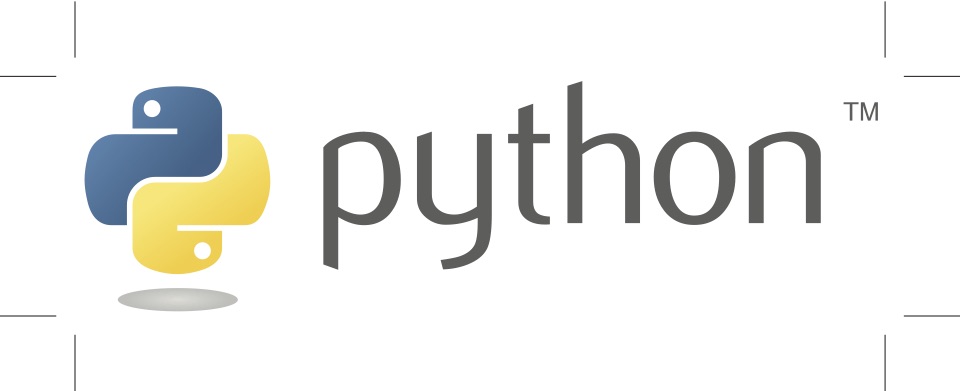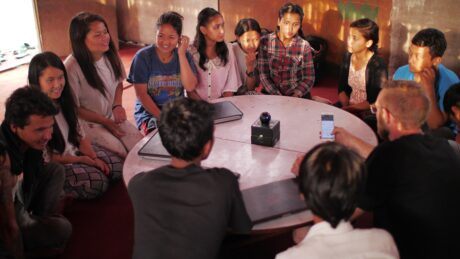You are new to software development but don’t know where to start. This is common among a lot of beginning programmers. Is Python a Good Programming Language to Learn for Beginners? There is a lot of different options when choosing programming languages. It’s easy to try to learn them all. While doing so, you get burned out and never focus on learning one programming language in depth. This was my struggle when I started coding. I was so excited about it and wanted to learn everything there was to know but didn’t focus.

seeklogo.com
Since I didn’t have a specific focus, I got burnt out by trying to learn everything. It is best to have a particular direction. I recommend Python for your first programming language due to its conciseness and versatility.
Why Should I Choose Python?
I would recommend something other than following my path. I didn’t research what programming language to learn, so I started with Java, which is verbose and not beginner-friendly. Here is a snippet of a method in Java.
public class Main {
public static void main(String[] args) {
System.out.println("Hello World");
}
}
If you are looking at that code, you were thinking, yikes!!! Java has its advantages and disadvantages, just like any other programming language, but it could be more beginner developer-friendly and can lead to quick burnout.

Photo by Ketut Subiyanto from Pexels
Don’t worry like this guy. There is a more comfortable option to get the same result.
Python has a simpler syntax than many other compiled languages like Java. Universities are starting to teach Python in their programming 101 courses.
def main():
print('Hello World')
main()
Pros
Usability
Of all the coding samples from above, what was easier to understand? Was it the first example or the second? Chances are you thought the second example was more straightforward to understand than the first. You didn’t have to surround it in a class or do a public static method. One of the main reasons many developers love Python is that it is human-readable and a lot less verbose.
You can do many things with Python, one of the most flexible languages. If you have a question about employment for Python skills, you do not have to worry. It has become rapidly more popular in the past few years, and there is a high demand for it in the workplace.
Some of the most popular things to do with Python are extracting data, data visualization, and data science. Django is a vast web development framework built on Python where you can make great web applications. Web Development is my personal favorite.
Developer Community
Since Python is becoming increasingly popular every year, there is much information online. There is a plethora of information online for every programming language, but Python alone has the most resources.

A lot of packages
There are a lot of packages in Python. I don’t mean packages like the ones that the UPS and USPS drivers deliver. But there is extra functionality that it’s an add-on to the python programming language. If you want to delve into Machine Learning and A.I., Python has packages that help create these applications.
Web Development
I love web development, and it is a great career choice. One of the benefits of Python is that it supports web development. Although you still need to use JavaScript on the front end because Python is a backend language.
Some of the popular frameworks for Python are Django and Flask.
Drawbacks
Execution Speed
Think of Python as a high-level language like a simplified, universal recipe that anyone can read, regardless of their cooking skills. This simplicity makes it easy for us, the chefs in this analogy, to understand what we’re supposed to cook without getting bogged down in the technicalities of professional culinary terms.
When you run a Python program, it’s like having an assistant chef (the interpreter) who reads the recipe (your code) step by step and prepares the dish accordingly. This process happens in real-time, as the assistant chef reads each instruction and immediately acts on it.
Sometimes, to make the process more efficient, your Python recipe is pre-converted into a special format called bytecode. This is akin to preparing a mise en place, where all your ingredients are prepped and ready to go. The bytecode is a more streamlined version of your recipe, not quite the raw ingredients but not the finished dish either. This prepped recipe is then executed by a special kitchen (the Python Virtual Machine or PVM), which understands this format perfectly and can cook the dish more efficiently than following the original recipe step by step.
The term “compilation” in Python’s world refers to this process of prepping your recipe into bytecode, not turning it into a completely different form as you would in languages like C or C++, which are like writing detailed instructions for professional chefs in a commercial kitchen.
Over the years, computer scientists have developed these high-level languages (like our simplified recipes) to make programming more accessible, much like how simplified recipes have made cooking more accessible to novices. However, just as a dish prepared by a professional chef in a commercial kitchen might be more refined (or faster to prepare) due to their expertise and equipment, low-level programming languages can run faster because they’re closer to the “machine’s language” – the basic instructions that computers understand directly. But for many of us, the ease and accessibility of using a high-level language like Python are worth the trade-off.

You don’t have to learn these low-level programming languages to start your programming journey because they aren’t as beginner developer-friendly and high-level programming languages. After all, they are challenging to understand and have a staple learning curve. However, if you start to master high-level programming languages, like Python, you can easily transition to lower-level languages. This can undoubtedly help your software development career.
When you are starting your development journey, the speed of the programming language shouldn’t be a significant concern.
Game Development
Python has a popular package for game development, pygame, but it is only 2D. For game development, you want to go with the most popular platform to make games, Unity. If you’re going to learn to build games with Unity, you need to know C#.
Since Python is a high-level language, it merely needs to run faster for all the advanced algorithms required in game development.

Photo by Alexander Kovalev from Pexels
Recommendation
You have finally found a beginner-friendly programming language by reading this article. Congratulations. Now that you know the great things you can do with Python, you want to find a great place to learn. You can click below for my great review on Codecademy, where you can learn Python.
Conclusion
I hope you enjoyed this article and found it helpful as you pick out your first programming language. Please share this article on social media and comment if you have any questions.
If you are a more seasoned developer, tell me what drawbacks and benefits did I miss? Do you agree that Python is the most beginning developer-appropriate language?
Thank you for reading my post. Leave your comments below to participate in this engaging community. Be sure to sign up to receive updates of more incredible articles.
I have been in the web development industry since 2016. It is my desire to guide aspiring and seasoned developers alike through the complex landscape of web development and software engineering. I combine my academic prowess, with degrees from Western Governor University and a Boot Camp certificate from Bloom Tech, with real-world experience to educate and inspire.
As the force behind DevTuneUp.com, I offer a treasure trove of tutorials, how-tos, and insights into the ever-evolving tech industry. With a sharp focus on demystifying technology and a goal to make DevTuneUp.com a cornerstone for tech enthusiasts, I leverage my expertise in SEO optimization and social media marketing to reach and empower a global audience. Join me on this journey to navigate the digital world with confidence and skill.
First of all thanks for writing this article. I am a complete beginner and want to learn coding. However, one thing about Python concerns me. I hope you do not mind a question. How well does it scale for more complex projects? As a beginner’s skillset grows, will Python’s design continue to be an advantage, or might its dynamic nature and lack of strict typing become a hindrance when building larger, more intricate systems? I don’t seem to get a clear answer on this in my research.
Python is scalability in managing both small and complex projects, thanks to its extensive standard library and support for multiple programming paradigms like functional and object oriented programming.
As your skillset grows, Python’s dynamic nature and readability continue to be advantageous, facilitating rapid development and prototyping. However, the lack of strict typing can be mitigated by using type hints and third-party tools, like MyPy, to ensure type safety and prevent errors in larger systems. Ultimately, Python’s design, complemented by best practices and external tools, can support the development of intricate and large-scale applications effectively.
This article says Python is a great first programming language to learn because it’s easy to understand and beginner-friendly. It’s used for data stuff, web development, and even has some machine learning applications. The downside is it can be slower than some other languages. Overall, the pros outweigh the cons for beginners.
Your article on Python as a programming language for beginners is insightful! Python’s simplicity and readability make it an excellent choice for newcomers. I’m curious about your thoughts on Python’s versatility across different fields, such as web development, data science, and artificial intelligence. Have you explored these diverse applications in your own programming journey?
Personally, Python was my entry point into coding, and its straightforward syntax made the learning process enjoyable. I appreciate how Python’s extensive libraries and community support facilitate problem-solving and collaboration. Do you have any tips for beginners navigating Python’s ecosystem and choosing the right resources? Your expertise would be invaluable to newcomers eager to dive into programming. Thanks for sharing your perspective on Python’s suitability for beginners!
I hear there is a great 100 days of code on udemy for Python that is worth exploring. I have done some coding with Python, it shines for data analysis.
For web I just use javascript, and Node on the backend, because Node is Javascript too.
But Python simplicity makes Python a fast language for programming speed, but not execution which I mentioned earlier.
Hi Jordan,
Thank you for this insightful piece on Python as a starter programming language. Your comparison between Python and other languages, particularly Java, highlighted Python’s accessibility and ease of learning. It’s encouraging for beginners like myself to hear about your own journey and how you found your footing with Python. Given Python’s wide applicability, from web development to data science, how would you recommend a beginner decide on a focus area? Is it better to explore broadly at first or to dive deep into one particular use of Python?
Thanks for demystifying programming for novices and sharing your knowledge!
Warm regards,
Makhsud
Focus on where your interest are
Dear Jordan,
The discussion around Python as an introductory programming language is relevant and thought-provoking. Python’s simplicity, readability, and a vast array of applications make it an appealing first language for beginners. The author convincingly argues for Python’s suitability, highlighting its ease of learning, strong community support, and versatility across web development, data science, and artificial intelligence. However, they also touch on potential drawbacks such as execution speed and limited use in game development, presenting a balanced view. My take is that for beginners seeking a foundation in programming, Python’s advantages far outweigh its limitations. Its broad applicability and supportive ecosystem can significantly ease the learning curve and open up numerous practical application and career development opportunities.